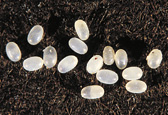If you have spotted fleas on any of your pets, these pests are not the only problem you have to worry about. You also need to remember that fleas lay eggs! You need to be able to not only kill the fleas, but their flea eggs to end the dreaded repetitive “flea cycle”.
Flea eggs are about 1/50th of an inch long, white, and oval shaped. Some people confuse flea eggs with the black specks of dirt typically found on your pet’s skin, but this is actually flea fecal matter or perhaps dried blood. When there is a large number of flea fecal matter, flea eggs are usually not far away. Flea eggs tend to hatch anywhere from 2 days to 2 weeks, this is when temperatures range from 80-90˚, and with more than 70% humidity.
When animals move and jump up and down on your furniture, more than likely these eggs can roll off of their host and onto something else. It’s always beneficial to keep this in mind when trying to eliminate all potential flea problems. In extreme frigid temperatures, flea eggs will rarely survive, but flea pupae have a much better chance of surviving these conditions.
There are several measures you can take in order to drastically lessen the chance of flea infestation in your home. A continuous and thorough cleaning around the house is your best bet. First, start by routinely vacuuming around your house. Vacuuming not only sucks up flea eggs, but it’s beneficial for picking up bits of dried blood, which serves as a food source for flea larvae. It’s important that you spend time researching, and finding the right and most efficient vacuum for your house.
A great option for killing fleas and their flea eggs is to have your carpets and upholstery cleaned with hot water extraction, or also known as “steam cleaning”. Hot water extraction is sure to eradicate these nuisances due to the extreme hot water temperatures projected into the carpet and upholstery fibers.
Also, remember to routinely wash your pets bedding, and toys (that are “washer-friendly”) in very hot water. Any items that cannot be tossed into a machine washer may need to be thrown into the garbage.
Another great tip is to treat your pets for fleas as well. Try buying a flea collar, flea pills, or a good brand of flea shampoo.
If your pets are outside in the yard frequently, it’s best advised to spray your yard with a flea pesticide. The best time to treat your lawn is after it is watered, or rains. The water will cause them to come up higher, or possibly drown in the mud. Fleas usually lay their eggs in cool areas of your yard, so concentrate the spray more in these locations.
If you follow these procedures, your house is most definitely far much closer to being flea free!


Leave A Comment